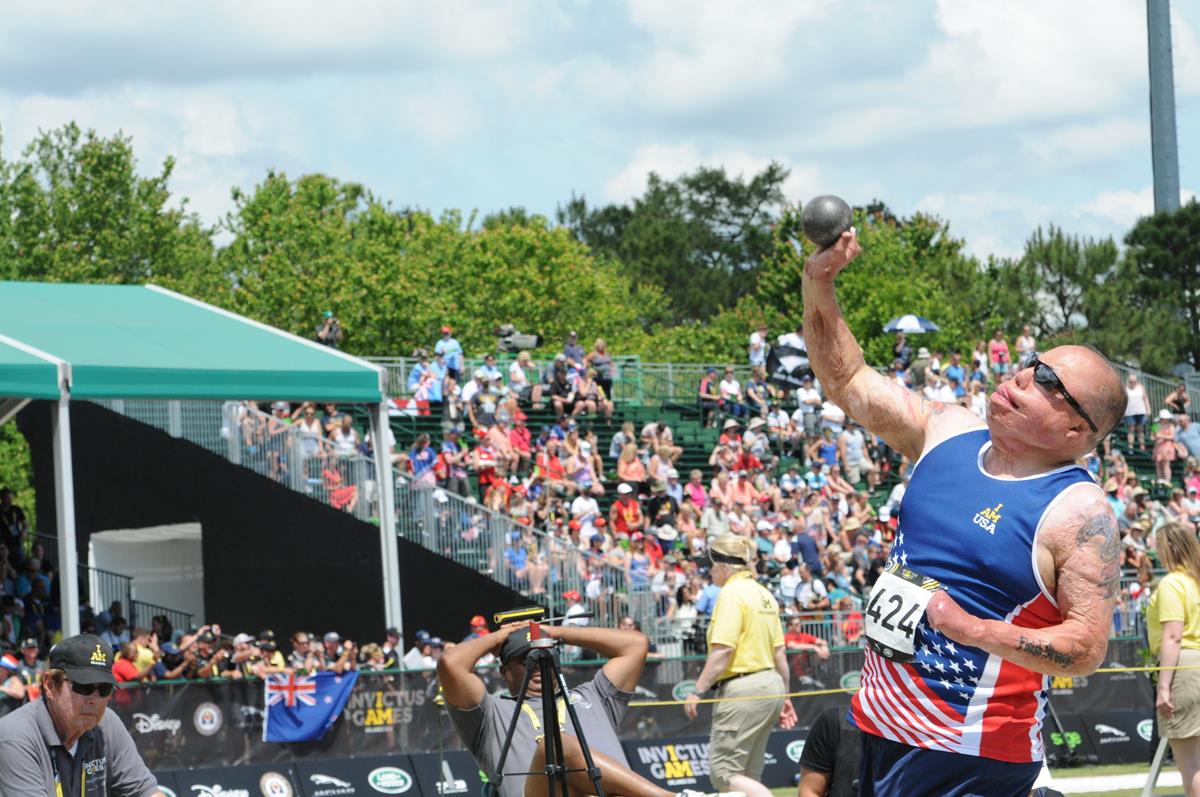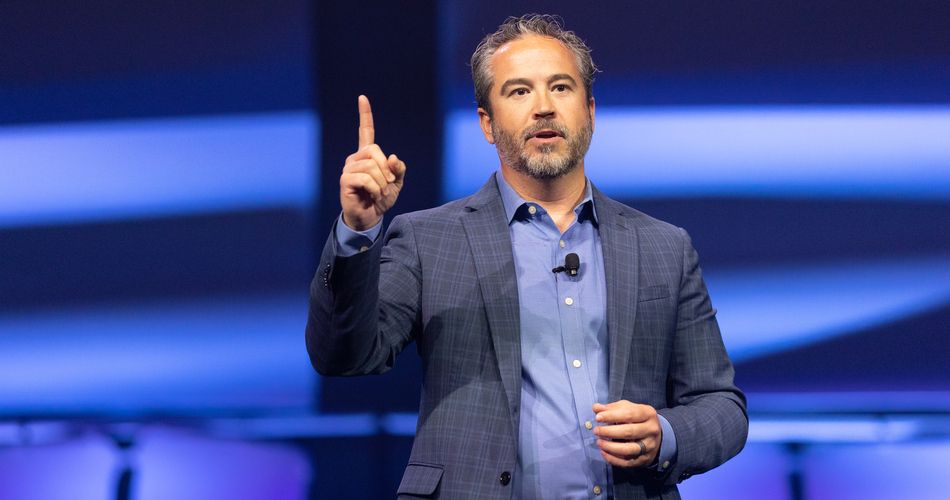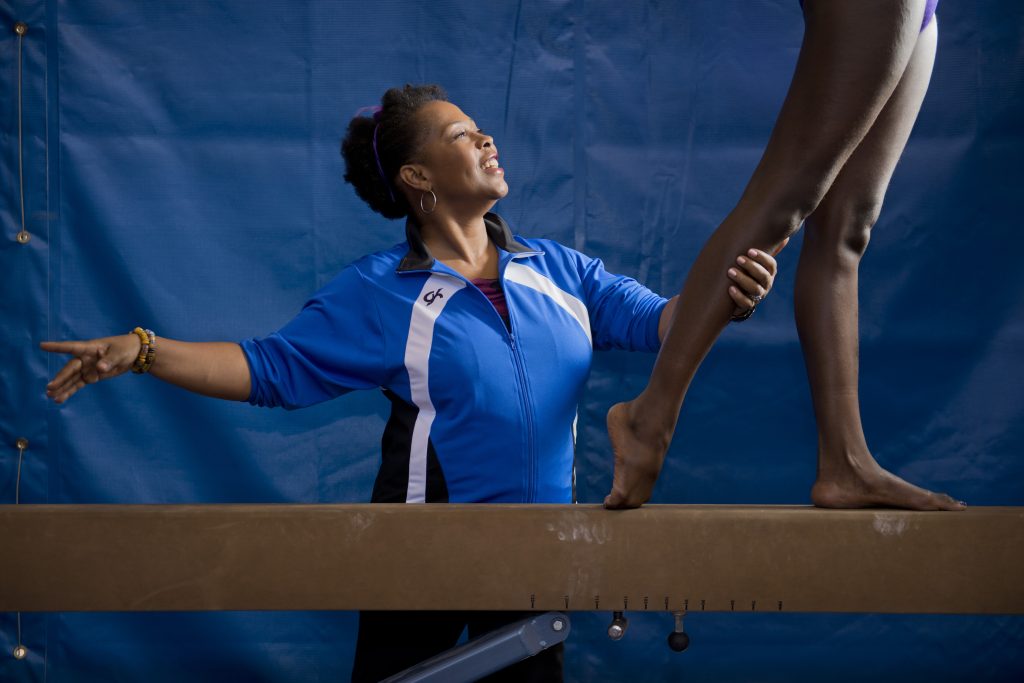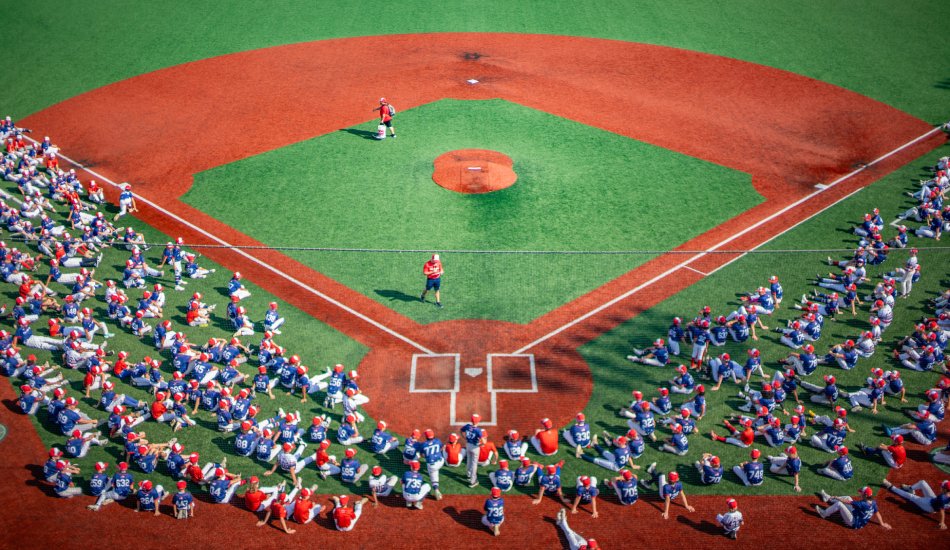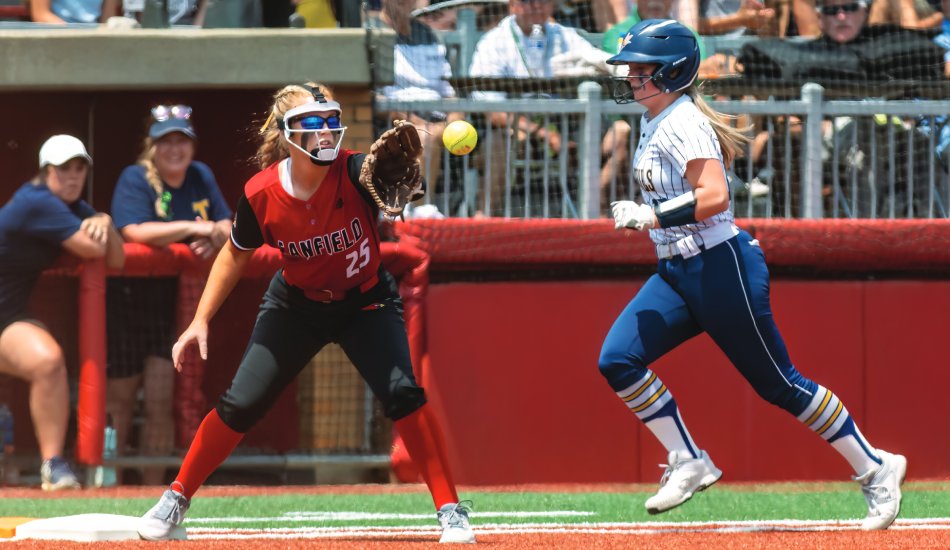When the eighth Department of Defense Warrior Games began June 30 in Chicago, Air Force Master Sergeant Israel Del Toro, Jr. was on hand to compete, just as he was for the previous seven games.
The fact he’s attended every Warrior Games and participates in multiple events like cycling, track and field, shooting and sitting volleyball for Team SOCOM (U.S. Special Operations Command) is a testament to his strength and determination.
That and the fact he’s still breathing.
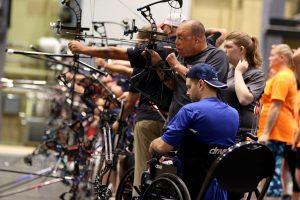
On Dec. 4, 2005, one day before his wife Carmen’s birthday, Del Toro was assigned to an Army unit that called in airstrikes in Afghanistan. As his team rolled through the Afghan mountains looking to ambush the Taliban, the Humvee he was riding in drove over a buried pressure-plate mine that detonated. His body engulfed in flames, Del Toro jumped out of the truck and into a nearby creek to douse the fire.
“I thought to myself, I’m going to die here. I’m never going to see my wife and son again,” Del Toro said.
That was almost the case.
Del Toro was airlifted to a military hospital in Afghanistan and slipped into a coma for three months. He suffered inhalation burns and third-degree burns to over 80 percent of his body. He lost all the fingers on his left hand except for his thumb while the fingers on his right hand were amputated.
He was initially given a 15 percent chance of survival and almost died three times. When Del Toro emerged from his coma, doctors told him he would likely never walk again or breathe without a respirator. He thought otherwise.
“When the doctors told me that, I told them they can all go to hell,” Del Toro said. “Two months after that, I walked out of the hospital on my own.”
The road to recovery was long and arduous for Del Toro, who has undergone more than 120 surgeries since the bombing. Less than a year after the accident, Del Toro was walking without assistance and was awarded the Purple Heart for bravery in the face of adversity. He also became the first 100-percent-combat-disabled Air Force technician to re-enlist when he rejoined the Air Force in 2010.
“It was hard. You go through the most intense therapy. You find out what drives you,” Del Toro said. “My son (14-year-old Israel Del Toro III) drives me. No matter what obstacles are placed in front of me, I’ll beat them. For him.”
During his rehabilitation, Del Toro began competing in adaptive sports and before long became a force to be reckoned with. He set world records in discus, javelin and shot put and won a gold medal at the 2016 Invictus Games.
“(Adaptive sports) are an amazing experience,” Del Toro said. “They get people who think they can’t do anything anymore and feel like they can. It brings out the spirit in everyone. It shows everyone that our brothers are going to be here for us no matter what.”
Del Toro’s heroism was lauded in July of 2017 when he was awarded the Pat Tillman Award for Service at the 25th annual ESPYS, ESPN’s signature awards show that was presented live on ABC.
“People say I inspire them, but I want to show everybody I’m just a regular guy,” Del Toro said. “Everyone here has obstacles. Everyone here is a hero.”
Alex Eudy (SOCOM)
Alex Eudy, an active master sergeant special operations weather specialist from Highlands Ranch, Colorado, is a renowned cyclist for Team SOCOM as well as an accomplished competitor in the shot put and discus.
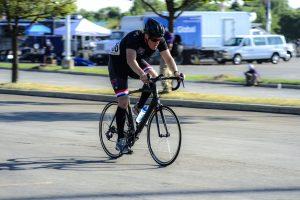
Photo by Michael Bottoms, USSOCOM Office of Communication
He’s come a long way in the past eight years, since that fateful day in January of 2009 in Afghanistan when he suffered two shattered feet and ankles from an improvised-explosive-device (IED) blast.
Only two months into his first deployment (he enlisted straight out of high school), Eudy was on patrol when the Humvee he was driving rolled over a roadside bomb. The bomb detonated, causing Eudy’s vehicle to somersault three times, rendering him unconscious and unable to walk.
Doctors initially suggested Eudy might need a lower leg amputation, but an ankle fusion procedure saved him from that fate. Since then, he has undergone multiple surgeries and completed more than eight months of rehabilitation en route to his recovery.
Eudy returned to duty in July of 2009 to provide administrative support and has been asked to speak at numerous military events. He has served on the Department of Defense Recovering Warrior Task Force, representing the Air Force and U.S. Special Operations Command and has won numerous military awards.
“I faced many obstacles during the healing process,” Eudy said. “I had to learn to walk again and after that, I’m just happy I get the chance to compete against my brothers and sisters in arms.”
Eudy credits the Warrior Games with assisting his recovery as well as the recovery of soldiers throughout the world. During the 2017 games, he earned a silver medal in the 1,500-meter 4.5 event.
“Everyone is highly motivated,” he said. “The Warrior Games are a unique opportunity that allows people of all different injury levels to meet and compete against other competitors. It certainly has had a huge impact in helping me get back to where I was before my injuries.”
Matthew Grashen (Marines)
For 27-year-old Lance Corporal Matthew Grashen, the Warrior Games are a chance to return to his roots.
Grashen, who competed in his first games in 2017 and is a member of the Marine Corps wheelchair basketball team, grew up playing basketball in Chicago.
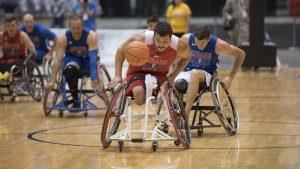
Photo by Roger L. Wollenberg
“I love basketball,” Grashen said. “It means so much to me to be able to play the game again.”
In August of 2013, Grashen, who joined the military in 2011, lost both of his legs when he stepped on an IED in Afghanistan.
“I was on foot patrol. I stepped on a pressure plate packed with 20 pounds of explosives. It shot me high up into the air,” Grashen said. “My guys sprung into action and shot me up with morphine. I was awake the entire time. Right away I became a double amputee.”
He was sent to Walter Reed National Military Medical Center in Bethesda, Maryland, where he started the beginning stages of his physical therapy. After three months of therapy, Grashen was able to stand and walk on his prosthetic legs.
While recovering at Walter Reed, Grashen learned about wheelchair basketball and tried out for the sport. He quickly developed an appreciation for the game and continued to play after being relocated to the Navy Medical Center in San Diego.
“It’s important to me that I’m able to play basketball again,” Grashen said. “It helps me stay competitive and gives me a chance to see how far I can push myself.”
In order to keep himself in basketball shape, Grashen works out two to three hours per day and diligently works on his shooting form.
His efforts paid off during this year’s games as he helped the Marines earn a bronze medal in wheelchair basketball while also winning a silver medal in the seated shot put 5.0 category. Now that the games have finished, Grashen plans to continue honing his skills but also has his sights set on assisting others.
“I want to help injured guys improve their game so they can get to the level I’m at,” Grashen said. “They see me as a good basketball player and I want them to know they can do what I did if they put the work into it.”
Fred Lewis (SOCOM)
Medically retired Army Staff Sergeant Fred Lewis sports an impressively braided beard that accompanies his jovial persona and infectious smile. That smile, however, belies the demons that have haunted the 14-year Army veteran.
Lewis suffers from post-traumatic stress disorder, seizures, migraines, hearing loss and tinnitus after he was shot in the helmet in August 2008 in Afghanistan. His shoulder is also missing part of its clavicle because of a break incurred during active duty.
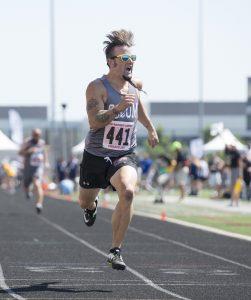
Photo by Roger L. Wollenberg
Those injuries forced Lewis to leave the military in 2009, a move he struggled with.
“I was living in Maui and I was floundering,” Lewis said. “I was on a lot of medication and I didn’t know how to adapt to civilian life. I didn’t know what to do with myself. The big problem we have as veterans is we tend to not want to ask for help and the further away we get from help, the harder life gets.”
It wasn’t until Lewis was invited to try out for the Warrior Games that Lewis regained a sense of purpose.
“It’s changed my life,” Lewis said. “The games and the community around it gives you something to hold onto when you have a hard time transitioning into the civilian world. These guys get me in a way civilians don’t.
“About a year ago I was 40 pounds heavier and feeling bad about things. Now I’m devoted to nutrition and a healthier lifestyle and I get to spend time around my friends. I didn’t have any friends before. I didn’t feel like I fit in anywhere. But now, I can share war stories with these guys and we can get together and bond. These games give me a purpose.”
Lewis thrived at the 2017 Warrior Games, earning a gold medal in the 800-meter run and a silver medal in the 400-meter competition.
“Being around people who are worse off than me and still have a positive outlook on life has been important for me,” Lewis said. “This is a huge honor for me to represent Team SOCOM.”
Matthew Cable (Air Force)
When one casts a gaze upon Air Force Staff Sergeant Matthew Cable, the last thought that comes to mind is the word “wounded.”
Cable, a 26-year-old member of the Air Force Security Forces in Great Falls, Montana, stands 5-foot-11, is a chiseled 220 pounds and better resembles an NFL safety than a wounded warrior. Two years ago, though, Cable was on his deathbed with virtually no expectation he would recover.
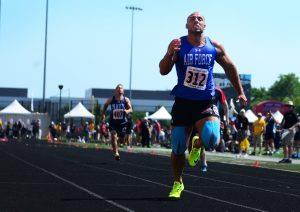
U.S. Air Force photo by Staff Sgt. Chip Pons
In 2015, Cable was diagnosed with acute myeloid leukemia, a rare cancer that progresses quickly if not treated and can be fatal within a few months. Making matters worse, he developed a blood infection that caused all of his vital organs to fail. With his health rapidly failing, doctors put Cable into a coma, hoping it would help fight the infection. He spent 18 days in the Intensive Care Unit and was in a coma for five days. During that 18-day stretch, he lost 60 pounds and doctors were prepared for the worst.
“The doctors told my mom that there wasn’t anything they could do,” Cable said. “They told my family they should say their good-byes to me. I wasn’t supposed to wake up. But after two days, I did.”
Cable’s health stabilized, and he spent three weeks in the hospital recovering and relearning how to use his body.
“That was tough. I had to learn how to eat and walk again,” he said. “I had to learn how to use my legs again. For two to three months after, I felt weak and tired all the time. My body always ached. It felt like I had flu-like symptoms all the time.”
After being discharged from the hospital, Cable struggled to regain the confidence that came with being an All-State wrestler and football and track star at Great Falls High School in Montana. He battled depression and wondered where his life was headed.
Six months after leaving the hospital, his questions were answered when he was introduced to the Air Force Wounded Warrior Program.
“That program has been huge for me,” Cable said. “It got me into adaptive sports, and it helped me meet new brothers and sisters. It’s been humbling to see all these athletes overcome the obstacles and injuries they’ve sustained. We’ve all gone through some sort of injury, either physical or mental. Everyone here is family to me. They all really motivate me.”
Cable became enamored with CrossFit, an intense fitness regimen that sees him work out three to four hours per day, six to seven days per week. He built up his strength and endurance and recently deadlifted 635 pounds during a competition.
The 2017 Warrior Games were Cable’s first, and he made the most of his inaugural showing by capturing gold medals in the 100-meter and 200-meter races, a silver medal in the shot put and a bronze medal in the discus and the 4-x-100-meter relay.
“My main goal is to win every time I compete, but I’m also just trying to be happy and have fun,” Cable said. “I have a lot of friends who have passed away. You only live once, so you might as well live it to the fullest.”
– Jason Paha

